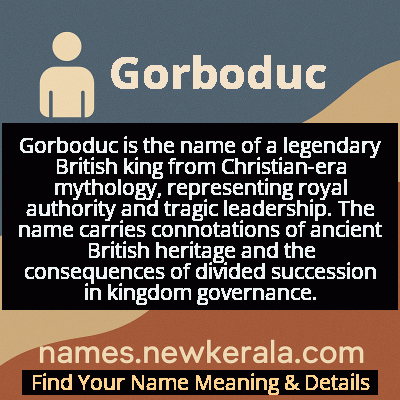Gorboduc Name Meaning & Details
Origin, Popularity, Numerology Analysis & Name Meaning of Gorboduc
Discover the origin, meaning, and cultural significance of the name GORBODUC. Delve into its historical roots and explore the lasting impact it has had on communities and traditions.
Name
Gorboduc
Gender
Male
Origin
Christian
Lucky Number
4
Meaning of the Name - Gorboduc
Gorboduc is the name of a legendary British king from Christian-era mythology, representing royal authority and tragic leadership. The name carries connotations of ancient British heritage and the consequences of divided succession in kingdom governance.
Gorboduc - Complete Numerology Analysis
Your Numerology Number
Based on Pythagorean Numerology System
Ruling Planet
Uranus (Rahu)
Positive Nature
Strong sense of order, loyal, practical, and disciplined.
Negative Traits
Stubborn, overly serious, rigid, and prone to feeling restricted.
Lucky Colours
Blue, gray.
Lucky Days
Saturday.
Lucky Stones
Blue sapphire.
Harmony Numbers
1, 7, 8.
Best Suited Professions
Managers, engineers, accountants, organizers.
What People Like About You
Dependability, discipline, practicality.
Famous People Named Gorboduc
Gorboduc
Legendary King of Britain
Mythological ruler whose division of Britain between his sons led to civil war
Gorboduc (Literary Character)
Theatrical protagonist
Title character in the first English tragedy 'Gorboduc' (1561)
Gorboduc (Historical Reference)
Mythological ruler
Cited in medieval chronicles as an example of political instability dangers
Name Variations & International Equivalents
Click on blue names to explore their detailed meanings. Gray names with will be available soon.
Cultural & Historical Significance
The name gained renewed significance during the Elizabethan era when it became the title of the first English tragedy written in blank verse. The 1561 play 'Gorboduc' by Thomas Norton and Thomas Sackville used the ancient legend to comment on contemporary concerns about Queen Elizabeth I's lack of an heir. This adaptation transformed Gorboduc from merely a legendary figure into a symbol of political caution, establishing the name's enduring association with tragic leadership and the consequences of poor succession planning in the English literary tradition.
Extended Personality Analysis
The name Gorboduc evokes a personality marked by regal authority combined with tragic misjudgment. Individuals bearing this name are typically perceived as possessing strong leadership qualities, traditional values, and a deep sense of responsibility toward their legacy. However, they often struggle with critical decisions regarding succession and power distribution, displaying a fatal tendency to divide resources or authority in ways that ultimately lead to conflict. This creates a complex character profile of someone both respected for their position and pitied for their flawed judgment.
There's an inherent nobility to the Gorboduc personality, but it's tempered by a tragic flaw in political wisdom. These individuals often carry the weight of history and tradition heavily, feeling burdened by the consequences their decisions will have on future generations. They typically exhibit paternal instincts that conflict with political necessities, creating internal tension between familial love and the demands of leadership. The personality suggests someone who, despite good intentions, becomes the architect of their own downfall through well-meaning but ultimately destructive choices about inheritance and power.
Modern Usage & Popularity
In contemporary naming practices, Gorboduc remains virtually unused as a personal name and exists primarily as a historical and literary reference. The name has no presence in modern birth registries or popularity charts, and its usage is confined to academic discussions of British mythology, Renaissance literature, or historical fiction. When encountered in modern contexts, it almost always refers to the legendary king or the Elizabethan play rather than serving as an actual given name. The name's heavy mythological baggage, tragic associations, and archaic sound make it impractical for modern parents, cementing its status as a purely historical artifact rather than a living personal name. Its occasional appearances in fantasy literature or historical novels serve to evoke ancient British heritage and tragic nobility rather than representing contemporary naming trends.
Symbolic & Spiritual Meanings
Symbolically, Gorboduc represents the profound consequences of political division and the fragility of inherited power structures. The name embodies the tragic irony of a ruler who, in trying to provide for all his heirs, ultimately destroys everything he sought to preserve. It serves as a powerful metaphor for the dangers of splitting authority and resources, illustrating how well-intentioned decisions about succession can lead to catastrophic outcomes. The symbolism extends to broader themes of familial conflict, the weight of tradition, and the ways in which paternal love can become politically destructive when not tempered by strategic wisdom. Gorboduc stands as a cautionary symbol about the importance of unified leadership and the perils of allowing personal attachments to override political necessities.

